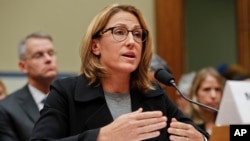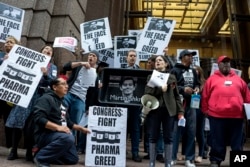Lawmakers are venting over high prescription drug costs, but if Congress is looking for culprits, it might want to look in the mirror.
Republican- and Democratic-controlled congresses, and presidents of both parties, may have set the stage for the startling price increases that have consumers on edge.
In the last 13 years, Congress passed major legislation that expanded taxpayer-financed coverage for prescription drugs but lacked explicit mechanisms for dealing with costs, instead relying mainly on market forces.
Lawmakers look like unwitting enablers in the eyes of some experts.
"Congress in attempting to expand access to prescription drugs has inadvertently created a situation where price increases are much more rapid,'' said economist Paul Ginsburg, a former congressional adviser on Medicare who now directs the Brookings Institution health policy center.
Government-sponsored coverage injected more dollars into the market for medications, and new consumer protections curtailed some blunt instruments insurers used to control costs, such as annual and lifetime limits on the dollar value of coverage.
"The history we see over and over again is that when the government steps in as a guaranteed payer without regard to price, it will be taken advantage of,'' said Dr. Peter Bach, director of Memorial Sloan Kettering's Center for Health Policy and Outcomes.
Government's role
Congressional indignation was on display recently as House members grilled Mylan CEO Heather Bresch about price increases for her company's EpiPens, prefilled syringes that deliver a rescue drug for people suffering life-threatening allergic reactions. The company was accused of gouging patients, but there was little introspection about the role of government.
It's not that a secret signal went out from Capitol Hill making it OK for Mylan to charge $608 for an EpiPen two-pack. Instead, government policies make it easier to introduce new medications at a high price and to charge more for existing drugs.
"It has dramatically changed the pricing environment,'' Ginsburg said. "If a manufacturer sets the price higher, there will be less resistance to that price because a lot more people will be able to access that drug than in the past. The rational thing for the manufacturer would be to raise the prices both of existing drugs and newly introduced ones.''
Consider the following:
- Passed in 2003 under President George W. Bush, Medicare's Part D' prescription benefit provided drug coverage to seniors. Medicare was forbidden to negotiate prices. Instead, private insurers and pharmacy benefit managers would keep costs in check. For a while it seemed to be working amid greater use of generic drugs. But expensive new specialty drugs and price increases for some older medications changed things. A feature of the program that protects beneficiaries from catastrophic costs has allowed drug makers and insurers to pass the bill for very expensive medications on to taxpayers.
- Enacted in 2010 under President Barack Obama, the Affordable Care Act, or ACA, expanded coverage for the uninsured. It made prescription drugs an essential benefit and barred dollar limits on insurance coverage. The drug industry supported the legislation and, according to documents released by House Republicans, got a White House commitment not to seek Medicare rebates opposed by drug makers. The administration helped defeat an attempt to let patients import lower-cost drugs from abroad.
- Obama's health care law provided makers of cutting-edge biologic drugs 12 years of protection from generic competitors, not a shorter period sought by consumer advocates.
"It's not clear to what extent Part D and the ACA may have directly caused the very large increases in drug prices in the last five years or so,'' said Rick Foster, formerly Medicare's chief actuary. "Having said that, it wouldn't surprise me if the significant increase in insurance coverage, and especially the catastrophic protection, contributed to the drug price increases.''
Drug industry responds
The drug industry, a formidable lobby, rejects such speculation.
"Fundamentally, we disagree that there is not adequate cost containment for medicines built into Part D, or the ACA,'' said Lisa Joldersma, vice president of policy and research with the Pharmaceutical Research and Manufacturers of America.
"We think the market is best able to manage the holistic picture and to strike the right balance across cost containment, access and continuous innovation,'' she added.
Mood for regulation
The public seems receptive to government action. A Kaiser Family Foundation poll released Thursday shows strong support for requiring drug companies to disclose how they set prices (86 percent), Medicare negotiations (82 percent), price limits on costly drugs to treat cancer and diseases like hepatitis (78 percent), and allowing Americans to import medications from Canada (71 percent).
Rep. Xavier Becerra, a senior California Democrat, says he doesn't believe Obama's overhaul and Bush's prescription benefit are responsible for high-cost drugs. But he still thinks Congress has to act.
"I don't think there's anyone who doesn't believe we need to do more aggressive oversight of the industry,'' Becerra said.
It may be getting late, suggests Urban Institute economist Eugene Steuerle.
"Government simply cannot provide monopoly power and at the same time say that it will pay a price set in the private market by those companies,'' Steuerle said. "Turning the power of the purse over to monopolists is absurd.''





